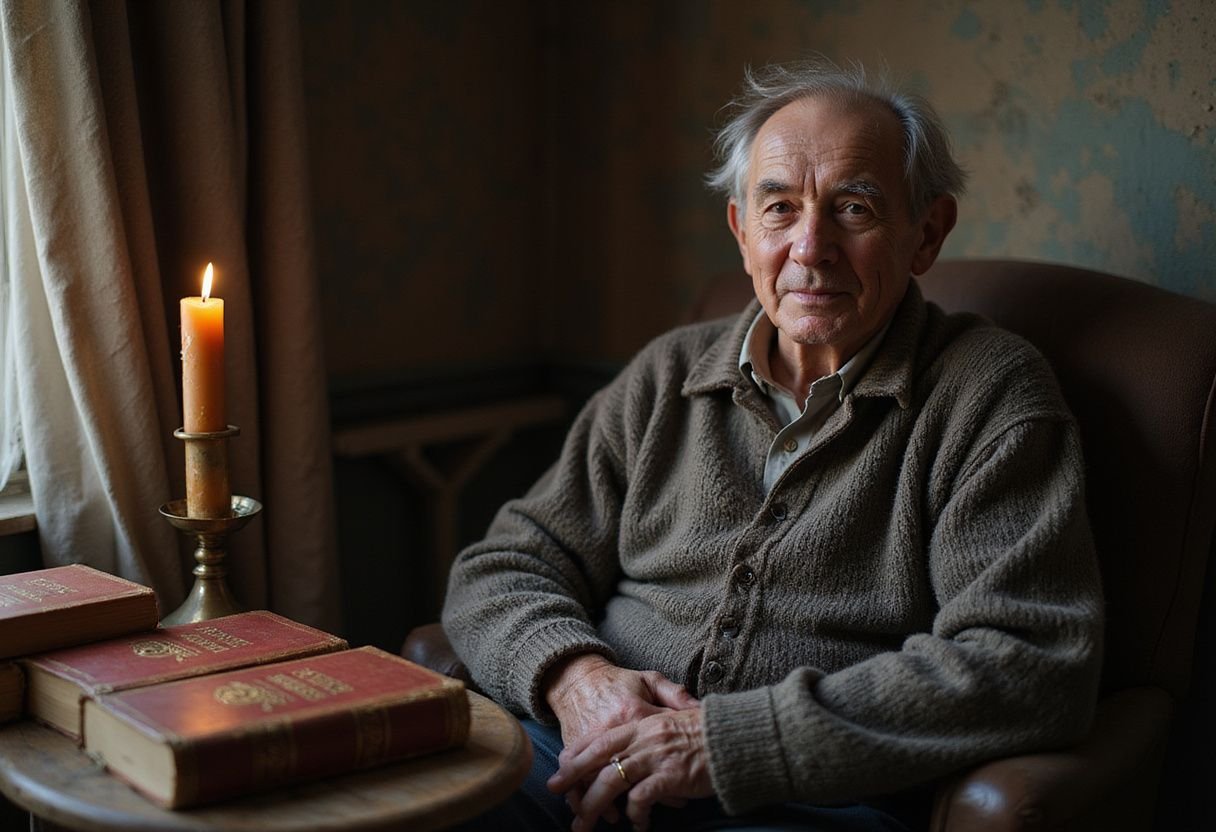Many people feel fear or worry when they think about death. These feelings are natural and common. Stoic philosophy can help anyone face mortality with calm and courage. A Stoic’s Guide to Facing Death Without Fear will show how daily meditation and acceptance bring peace about life’s impermanence.
Read on to find a few simple ways to live each day without fear of death.
Contents
- 1 Understanding the Stoic Perspective on Death
- 2 Overcoming the Fear of Death
- 3 Preparing for Death
- 4 Conclusion
- 5 FAQs
- 5.1 1. What does it mean to face death without fear using Stoic philosophy?
- 5.2 2. How can meditation help with grief about death?
- 5.3 3. Why do Stoics see acceptance as important in facing mortality?
- 5.4 4. How does rationality make someone less afraid of dying?
- 5.5 5. Can learning about impermanence help us find meaning in loss?
Understanding the Stoic Perspective on Death
Death is a part of life. Stoics accept this truth with clear minds. They understand that death will come for us all, and this understanding helps lessen fear.
Acceptance and rational thinking
I practice acceptance and rational thinking to face death without fear. The Stoics teach that death is a part of life. I recognize it as something natural and inevitable. This understanding helps me feel calmer about mortality.
Thinking about death often removes my fear. It reminds me that nothing lasts forever, including life itself. Embracing this idea brings peace of mind. I focus on what I can control and live fully in the moment.
This mindset leads to acceptance and allows for a more serene outlook on life’s end.
Embracing the inevitability of death
Acceptance and rational thinking lead me to embrace the inevitability of death. I understand that death is a natural part of life. It will happen to everyone, including me. The Stoics teach that facing this truth removes fear.
Instead of avoiding it, I invite thoughts about mortality into my day.
By recognizing this fact, I find peace in acceptance. Life is full of change and impermanence; nothing lasts forever. Death reminds us to cherish each moment we have. It encourages me to live fully and appreciate life now.
I reflect on the wisdom from the Roman Stoics who believed a good death brings tranquility and gratitude for life itself. This perspective helps ground me during difficult times; practicing mindfulness eases my worries about what lies ahead.
Recognizing death as a part of the natural cycle
Embracing the inevitability of death leads me to recognize it as a part of the natural cycle. Life and death go hand in hand. The Stoics teach that death is not an end, but a change.
Every being has its time to live and die, just like seasons change. I acknowledge that every living thing will face this fate eventually.
This perspective helps me accept my own mortality without fear. Daily reflections on life remind me that everything is temporary. The Stoic view invites me to think about death often, turning what once felt scary into something normal and expected.
By welcoming this truth, I find peace in knowing that my life is part of a larger cycle; nothing lasts forever, including my worries about dying.
Overcoming the Fear of Death
I think about death every day. This helps me face my fears and see life as a gift.
Daily meditations on mortality
Thinking about death helps me understand life better. Daily meditations on mortality bring clarity and peace.
- I set aside time each day to think about my own mortality. This practice reminds me that life is short.
- I reflect on the inevitability of death. Facing this fact helps reduce fear.
- Imagining my last moments brings a sense of calm. It encourages me to live fully now.
- I focus on the emotions that come with death, like grief and love. Understanding these feelings makes them less overwhelming.
- I appreciate what I have in the present moment. Gratitude for life grows through this meditation.
- Daily thoughts about death help me accept change as a part of life. This acceptance eases worries and fears.
- Recognizing that everything is temporary shifts my perspective on problems. Knowing nothing lasts can bring comfort.
- I acknowledge that my time will end someday; this keeps me grounded.
- Meditating on death encourages me to forgive more easily and hold onto anger less often.
- I use wisdom from Stoic teachings during these meditations, which guide my thoughts toward acceptance and peace.
Daily meditations remind me of life’s impermanence and help foster fearlessness in facing death’s reality.
Acknowledging the impermanence of life
I often think about how life changes all the time. Nothing lasts forever, and that includes our lives. The Stoics taught me to face this truth with calmness. Embracing the idea of impermanence helps me live better.
It reminds me that every moment is special and fleeting.
Fear of death seems silly when I accept this idea. Life and death are part of a bigger cycle. Both bring their own gifts, lessons, and wisdom. Recognizing that nothing is permanent allows me to appreciate what I have right now.
This acceptance brings peace to my heart as I prepare for whatever comes next, including the end of my journey here on Earth.
Focusing on what you can control
I focus on what I can control in life. The Stoics teach that fear of death is irrational. Life and death are part of the same change. Accepting this helps me see each day clearly. I remind myself to embrace my actions and thoughts rather than worry about things outside my reach.
Daily, I practice acceptance through meditation on mortality. This brings me peace. It reminds me to cherish moments with loved ones and express compassion. Thinking about how to live fully helps reduce fear around death, as it is an unavoidable part of existence.
Preparing for Death
Preparing for death means accepting it as a part of life. I think about what it means to not exist anymore. I focus on love and kindness while I am here. It helps me feel at peace with the idea of my own end.
If you want to know more, keep reading!
Embracing the concept of non-existence
Embracing the idea of non-existence helps me find peace. I understand that death is part of life. Accepting this truth lets me live fully and without fear. The Stoics teach that nothing lasts forever, including our lives.
This view makes me see mortality differently.
I practice accepting non-existence through daily meditation on death. This practice keeps my mind clear and calm about what lies ahead. It also reminds me to cherish every moment I have now, allowing for love and compassion in my life.
Understanding this connection prepares me for the inevitable change we all face: death itself.
Cultivating love and compassion in life
I find love and compassion essential in living a meaningful life. These qualities help me connect with others and create warm moments. The Stoics teach that I should embrace kindness every day.
This means showing care to family, friends, and even strangers. Being compassionate adds purpose to my actions.
Focusing on love helps me face life’s challenges more easily. It reminds me of what truly matters. Death is part of the natural cycle, but it does not need to bring only sadness or fear.
Instead, I can celebrate the time spent with loved ones while accepting that life has an end point. By cultivating these feelings now, I prepare for anything ahead, including facing mortality without fear.
Next, I can reflect on the legacy I leave behind.
Reflecting on the legacy you leave behind
Thinking about the legacy I leave behind is important. A good death involves mental peace and gratitude for life. I want to be remembered for love and kindness. The Stoics teach me that death is a part of life, not the end.
Reflecting on this helps me focus on what truly matters. It’s crucial to live fully and with purpose now. By embracing mortality, I can shape my actions today. Leaving behind wisdom and compassion means more than wealth or fame.
My goal is to inspire others even after I’m gone.
Conclusion
Facing death is part of life. I find strength in the Stoic way. Acceptance brings peace. A calm mind helps me embrace what is real. Living fully today makes fear less powerful tomorrow.
FAQs
1. What does it mean to face death without fear using Stoic philosophy?
It means accepting mortality, understanding impermanence, and practicing rationality. This helps build resilience and serenity.
2. How can meditation help with grief about death?
Death meditation lets you think calmly about change and loss. It brings wisdom and acceptance when facing grief.
3. Why do Stoics see acceptance as important in facing mortality?
Acceptance teaches detachment from things we cannot control. It gives peace of mind when thinking about life’s end.
4. How does rationality make someone less afraid of dying?
Rationality uses clear thought to look at fear directly. It helps people feel fearless by seeing death as a natural part of life.
5. Can learning about impermanence help us find meaning in loss?
Yes; knowing that all things change builds wisdom and strength during hard times like losing someone or something dear.

